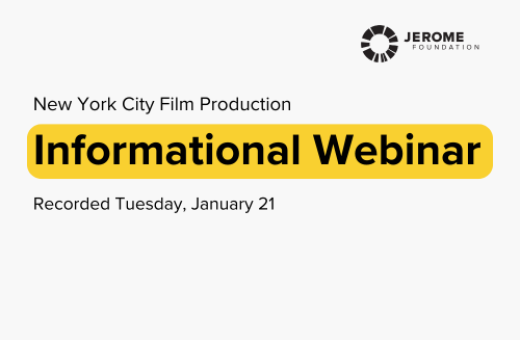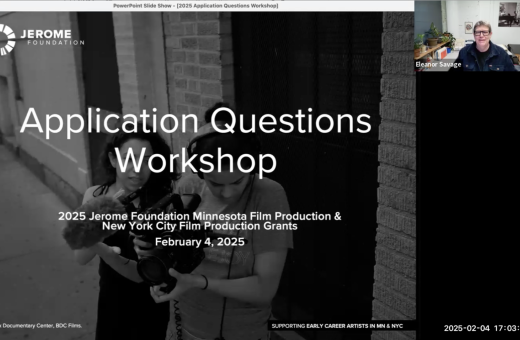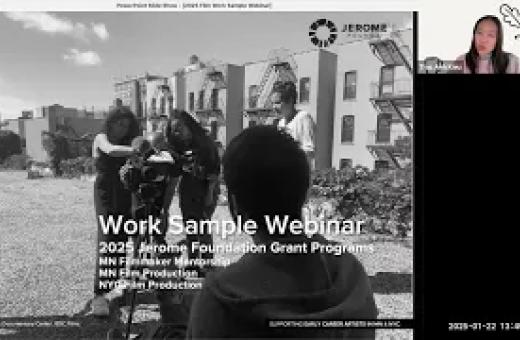New York
City Film
Production
Grant
2023 grantee Jingjing Tian
New York City Film Production Grant
This grant supports eligible New York City-based early career film directors whose work takes creative risks in expanding, questioning, experimenting with, or re-imagining filmmaking with production grants of up to $30,000.
The Foundation seeks to fund filmmakers who take creative risks, seek innovative approaches, have a clarity of purpose and vision for imaginative storytelling, are engaged directly with those involved in their filmmaking, and work to build relationships with and impact their creative community and the field.
Read the Full Program and Application Guide
Please note that the application questions are included in Application Information, starting on page 18.
Program Timeline
Informational Webinar
Jerome staff held a webinar to review the program and application process, along with a Q&A with attendees. Watch the recording.
Application Questions Workshop
Jerome staff held a webinar to provide context for and discuss ways to answer the application questions, along with a Q&A with attendees. Watch the recording.
Live Q&A Session
Bring your questions about the program and application to this Zoom session with Jerome staff. Register in advance for the live event. This session will not be recorded.
Deadline for eligibility review with Jerome staff
Phone appointments available for application questions
Sign up for an appointment in advance.
Application Closes
Late applications are not accepted.
Notification of grant status
Public announcement of grantees
Timeline to receive grant funds
Informational Webinar and Video Resources

Informational Webinar
At this webinar, Jerome staff reviewed the program and application and review process, followed by a Q&A with attendees. (This was recorded January 21, 2025.)

Application Questions Workshop
Jerome staff provided context for and discuss ways to answer the application questions, followed by a Q&A session with attendees. (This was recorded February 4, 2025.)
Live Q&A Session: Tuesday, March 18, 2025, 12–1 pm Eastern Time
Bring your questions about the program and application to this Zoom session with Jerome staff. Register in advance for the live event. This session will not be recorded.
Guidance Videos

Work Samples: Learn recommended practices for work sample submissions for this program and how you might apply them to other grant programs.

CV: Get tips and ideas for creating a CV that helps the panel understand your work and experiences.

Film Budget: Learn recommended practices for how to create a film budget, including tools, references, and guides you can use.
Contact Jerome Staff
Applicants are encouraged to email Jerome staff, Truc Anh Kieu (tkieu@jeromefdn.org) and Nell Augustin (jaugustin@jeromefdn.org), with questions about the program’s intent and to sign up for a 20-minute phone appointment to discuss eligibility or ask questions about the application. Please contact Andrea Brown (abrown@jeromefdn.org, 651-925-5615) with any technical issues or questions about the online system.


Born in Saigon and rooted in Minneapolis, Truc Anh (TA, pronouns she/hers) is a queer, Southeast Asian artist/maker, and racial justice grantmaker. She is passionate about creating the conditions for transformative change that centers racial, gender, and disability justice, especially at the intersections of LGBTQIA+ and Southeast Asian communities. In her previous role at Borealis Philanthropy, TA supported the Racial Equity to Accelerate Change (REACH) Fund which supported racial equity practitioners/capacity builders in the nonprofit sector.
As a 1.5 generation immigrant by way of war, Truc Anh is powered by stories of resistance and resilience. She practices art for healing and for joy. In her spare time, TA can be found outside in her garden, exploring the North Shore, cooking with her friends, or reading. Truc Anh graduated from Carleton College with a degree in Sociology and Anthropology with a minor in Women & Gender Studies.


Andrea Brown joined the Jerome Foundation in 2016. She came to the Jerome Foundation after five years at the Walker Art Center, where she was Associate Director of Strategic Marketing, and prior to that Associate Director of Digital Marketing and Marketing Manager. She worked in the New York office of the American Academy in Berlin before taking a 7-year detour into software at Marketing Bridge/Gage Marketing where she was Lead Account Supervisor.
Andrea has a B.A. in American Studies from Smith College.
The Program
In the most recent rounds, the New York City program has received on average 200–220 applications.
Because not all applicants request the same amount of money, the number of grants the panels recommend changes from one year to the next. On average, panels awarded 12 grants in recent rounds.
The Foundation has supported film projects since its founding in 1964. You can learn more about recent grantees or see all past grantees on our website. The past grantee search can also filter by year and by New York City and/or Minnesota.
Eligibility
No, it is too early for you to apply. We hope that you will apply after completing and publicly screening two films if you are then still eligible and interested in support.
Please first complete the eligibility quiz to make sure you eligible. Completing that quiz will clarify whether you meet our eligibility requirements. We also urge you to attend an information session. If you still have questions, please contact Jerome staff prior to applying.
We encourage you to review Jerome’s focus and review criteria (available in the Program and Application Information document) to see if those align with your approach to filmmaking.
Additionally, you should consider your production timeline. You will need to receive the funds and be in or begin production within the 18-month grant period from November 2025 through April 2027.
The Foundation supports directors working in multiple genres and, given our value around innovation and risk, applauds experimentation. The Foundation understands that you as an artist might change direction and interests in your film directing career. The challenge for panels in such a situation is being able to appreciate whether you have the skills and experience to move into a new form.
It is important to “connect the dots” in your application to help the panel appreciate how the past work should inspire such confidence that you can move in new directions. You should direct the panel’s attention to relevant elements that would inspire this confidence in the Work Sample Context fields for each of the work samples. You should also explain what groundwork has been laid, any mentorship or study in which you have engaged, what skills have been developed, and/or what motives impel you to undertake this new direction. We strongly encourage you to answer the optional question in the application, “If this project is different than your past projects, please share your plan for moving in this new direction.”
Yes, if you have established your primary residency in New York City, are still a resident at the application deadline and plan to continue to be a resident in New York City through April 2027.
Anyone who has an SSN (social security number) or an ITIN (Individual Taxpayer Identification Number) is eligible to apply—this includes DACA recipients and most types of VISA recipients. Individuals who do not have an SSN or an ITIN are not eligible to apply.
Current New York City filmmakers who plan to relocate to Minnesota before the application deadline should apply to the Minnesota Film Production program. If you are doing an extended residency or location shoot that impacts residency, please schedule an eligibility call with Jerome program staff.
No. Only film directors may submit applications and receive funding from the Foundation. While grantees may use funds for productions costs, including fees to actors, producers, writers and crew, etc., the applicant must be the film director/s. Producers, actors, writers, designers, editors and crew may not submit their own applications.
No. The program only supports independent work directed by the applicant. This type of work cannot be proposed as the basis of a project for which funding is requested.
No. This program’s exclusive focus is moving image media, which includes narrative, experimental, documentary, and animation, or any hybrid combination of these forms.
Absolutely. That said, if your project has been rejected by two or more different panels, you are strongly advised to seek counsel from staff before applying with the same project yet again.
No. This is an individual artist grant program, and the application must come from you, not from an organization. If you are selected for a grant, funds must be distributed directly to you as an individual or directly to your single-proprietor LLC (if relevant).
Yes. However, you may not use funds from the Fellowship and from this project grant to support the same costs that are supported by that Fellowship.
The Application
No. Only work samples from projects that you directed may be submitted. If you do not have at least 10 minutes of work samples from two different completed projects that you have directed, you are not yet eligible to apply for Jerome support.
While Submittable allows you to exceed recommended word counts, you are strongly discouraged from doing so. We require panels to review only the amount of material captured in the suggested limit fields. Past panels have reacted positively to concise writing. Panels have noted that “the pitch” is an important professional skill.
No. You may submit only one application per round, regardless of the number of projects you may be working on in the potential grant period. If you submit an application as an individual, you may not apply separately with a co-directing team, and no members of a co-directing team may be a part of more than one application. If you submit more than one application or if your name appears as an applicant in more than one application, all applications you submitted and in which you are named will be deemed ineligible.
No. The review process begins immediately after the deadline and cannot accommodate changes to your application.
No. Panels are asked to assess based on the work samples and materials as provided in the application. We believe the benefit these letters may offer is outweighed by the burden they place on you to request them, references to write them, and staff or applicants to ensure they have been submitted.
Only if you are a finalist and discussed by the full panel. Because of the time it takes panelists to review the number of applications we receive, asking them to provide written critiques for each application is beyond their capacity.
At the panel meeting to review the smaller number of finalists, staff take notes during discussions and subsequently provide feedback (if a finalist chooses to make an appointment to receive that feedback).
We will not, however, be able to offer non-finalists feedback on their applications beyond sharing general trends of what makes applications more or less competitive.
We know that the film community can be a small one, and we are diligent in ensuring that no one with a conflict of interest is part of the decision-making process on an application with whom they have professional or personal relationships.
In assembling a panel, we work hard to capture the diversity of the field, in terms of identity, aesthetic expression, genre and form, understanding of and relationship with early career artists, and geographic location.
At the same time, we want to ensure your confidence in the panels and their qualifications to consider artistic work. We therefore periodically post a comprehensive list of panelists we have used for past selection processes in multiple programs on our website, even while we do not link a specific panelist to a specific program or year. The panel composition changes annually, so knowing the identity of the panel in a given year does not provide insight into who will serve in the next round.
Panels are constructed to include leaders in film based in New York City, as well as those working within the national sphere. All panels are constructed to ensure that no single race or ethnicity constitutes a majority of the panel.
In addition to the listing of panelists, the roster of the grantees provides information about the filmmaker and projects supported by this grant program.
Budgets
Yes. Your fee is an allowable grant expense and can be included in the budget as part of the application. Given that this is a production grant, the panel will expect to see production expenses in the budget in addition to your own fees. Disproportionate fees or expenses that are out of line with the budget for your proposed project are typically questioned by panelists and will impact the panelist’s consideration of your application related to the feasibility criteria.
Any budget, large or small, qualifies. You are expected to identify sources of funding, including secured and potential funders, and the amounts they are expected to give for their project. For larger-budget films, it is helpful to reference the funding levels for your past films to indicate your ability to secure the funds needed to produce the project.
No, Jerome has funded projects that were completed for less than $30,000, though it is more and more rare that a Jerome grant will cover all production costs. When assessing feasibility, panelists look for evidence you have thought realistically about the budget. Applicants are encouraged to be thoughtful in developing the budget and fundraising plan. Panelists are experienced filmmakers and will know if the budget is out of line with the proposed budget. We ask you to include both committed and pending income sources in the project budget you upload to the application (noting whether they are secured, pending, applied for but not yet confirmed, or yet to be requested). The application gives you the opportunity to explain your plan and any contingencies.
Panels recognize that Jerome funding can, on occasion, be the first confirmed funding for a project and can then help secure or leverage additional funds. Secured funding, therefore, is not required. At the same time, panels are charged with investing grant funds in viable projects that are likely to move forward. Providing a list of other secured and/or potential funds gives the panel an indication of how realistic your planning for the project has been and how likely the project is to move forward. Projects with no backup funding sources or with inflated or unrealistic expectations about other contributors will raise questions about feasibility.

